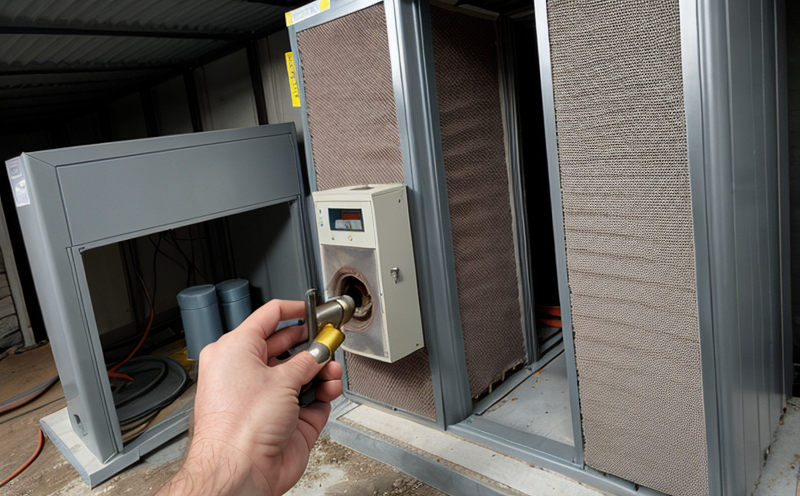JIS L1218 Thermal resistance testing of insulated fabrics
The JIS L1218 standard is a critical benchmark for measuring thermal resistance in insulated fabrics. This testing method is essential for industries such as apparel, automotive interiors, and building insulation, where fabric layers play a significant role in the overall performance, comfort, and energy efficiency.
Thermal resistance (R-value) quantifies how well a material resists heat flow, which is crucial when evaluating fabrics used in various applications. According to JIS L1218, this testing method involves measuring the thermal resistance of insulated fabrics by subjecting them to a specified temperature difference and airflow rate. The test setup includes an apparatus that maintains controlled conditions for accurate measurement.
For quality managers and compliance officers, understanding the nuances of JIS L1218 is vital as it ensures product performance meets regulatory requirements. R&D engineers can leverage this testing method to innovate products by optimizing fabric layers. In procurement, knowing the standards helps in selecting suppliers who meet these stringent criteria.
The test setup for JIS L1218 involves a calorimeter, which is designed to measure heat flow through the sample. The specimen preparation requires careful attention; it must be cut into standard sizes and shapes that fit within the calorimeter's chambers. This ensures consistency in testing results across different samples.
The test procedure typically begins by conditioning the fabric according to specified humidity and temperature levels. Then, the fabric is placed between two plates of a calibrated calorimeter. A controlled airflow is maintained around the sample, and the temperature difference between the hot and cold sides is measured over time. The thermal resistance is calculated using specific formulas provided in JIS L1218.
The accuracy of this testing method depends on maintaining precise environmental conditions such as temperature, humidity, and airflow rate. Any deviation from these parameters can lead to inaccurate results. Therefore, strict adherence to the standard's guidelines ensures reliable data that can be used for quality control, product development, and regulatory compliance.
Understanding the implications of JIS L1218 testing is crucial for stakeholders in the textile industry. The results help manufacturers ensure their products meet safety standards and perform optimally under various conditions. Compliance with this standard not only enhances product reputation but also contributes to environmental sustainability by promoting energy-efficient materials.
In summary, JIS L1218 thermal resistance testing of insulated fabrics is a fundamental process that guarantees the quality and performance of insulation textiles. By adhering to these standards, manufacturers can ensure their products are safe, efficient, and environmentally friendly.
Why It Matters
The importance of JIS L1218 testing cannot be overstated in industries reliant on thermal insulation. Compliance with this standard ensures that fabrics perform as expected under various conditions, enhancing both safety and efficiency. For quality managers, the primary concern is ensuring that every batch meets stringent quality standards. This testing method provides a reliable means to achieve consistency across production runs.
From a compliance officer's perspective, JIS L1218 testing helps in avoiding legal and regulatory issues by ensuring products meet all relevant standards. In R&D engineering teams, this test is pivotal for developing new materials that offer enhanced thermal performance. By understanding the nuances of the standard, engineers can innovate within the confines of established norms.
For procurement departments, selecting suppliers who adhere to JIS L1218 ensures that only high-quality fabrics are used in manufacturing processes. This not only improves product quality but also enhances brand reputation. Ultimately, compliance with this standard translates into safer and more efficient products, contributing to overall industry standards.
Customer Impact and Satisfaction
The impact of JIS L1218 testing on customer satisfaction is profound. Consumers expect products that are not only safe but also perform optimally under various conditions. For instance, in the automotive sector, passengers demand comfortable interiors that maintain a pleasant temperature without excessive heat transfer. By adhering to JIS L1218 standards, manufacturers can ensure their fabrics meet these expectations.
In building insulation applications, customers rely on products that provide effective thermal resistance, reducing energy costs and enhancing comfort. The results of JIS L1218 testing reassure both industry professionals and end-users about the reliability and performance of the materials used. This trust fosters customer satisfaction and loyalty, contributing to positive market reputation.
For quality managers, the ability to demonstrate compliance with JIS L1218 standards adds value to their products, enhancing overall customer satisfaction. Compliance not only meets regulatory requirements but also sets a benchmark for excellence in product performance. This ensures that customers receive high-quality materials that perform as intended.
Environmental and Sustainability Contributions
The environmental benefits of JIS L1218 testing extend beyond the immediate product quality to broader sustainability goals. By ensuring fabrics meet stringent thermal resistance standards, manufacturers can contribute positively to energy efficiency across industries. For example, in automotive interiors, materials that perform well under JIS L1218 guidelines help reduce heating and cooling costs, thereby conserving energy.
In building insulation applications, compliance with this standard leads to more effective use of resources and reduced carbon footprints. By selecting fabrics that offer excellent thermal resistance, manufacturers can contribute to sustainable construction practices. This not only enhances product performance but also supports environmental sustainability by promoting energy-efficient materials.
The testing method itself plays a crucial role in minimizing waste during production processes. By ensuring that every batch of fabric meets the required standards, manufacturers reduce the need for rework and scrap, thereby improving resource efficiency. Additionally, compliance with JIS L1218 helps in selecting suppliers who adhere to sustainable practices, further enhancing overall environmental contributions.
In summary, JIS L1218 testing contributes significantly to environmental sustainability by promoting energy-efficient materials and reducing waste during production processes. This aligns with broader industry goals of minimizing environmental impact while ensuring high-quality products.





